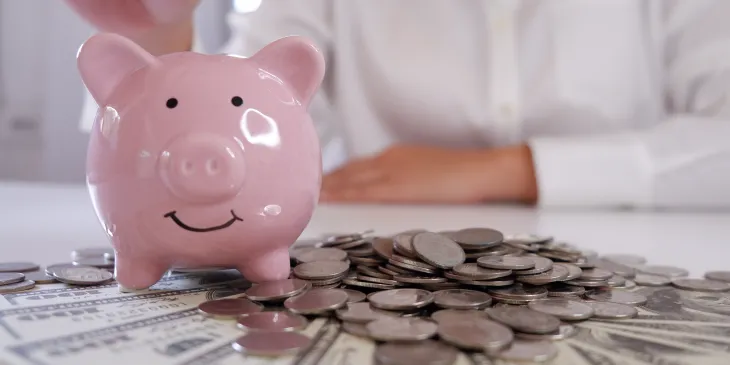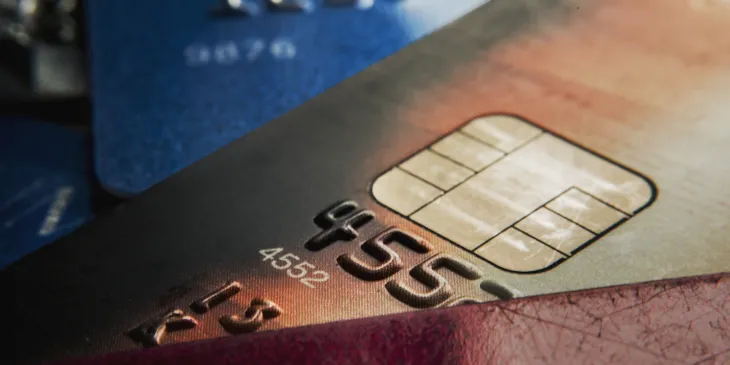Credit Card Debt: How to Know When You’re in Over Your Head

Summer is nearly here! If you’re like most, you’re already planning your summer vacation. But when planning for fun, are you also preparing for something else – like the resulting credit card debt?
Credit card debt is on the rise. According to the Federal Reserve, consumer spending in the first quarter of 2022 resulted in $986 billion in credit card debt, a $61 billion increase from 2021. The price of goods and services is up, and unfortunately, many are charging more than ever to keep up.
The problem is that anyone can get a little carried away, wind up knee-deep in credit card debt, and deal with financial stress. So, how much credit card debt is too much? And how can you rein in control if you’re in the red? While there’s no hard and fast rule on how much debt is too much, we have some tips to help determine where you fall and pick yourself up if you need to make some adjustments.
How Much Credit Card Debt is Too Much?
Determining how much credit card debt is too much is challenging because everyone’s finances differ. So, while there isn’t a hard-and-fast number, there are some sure signs when you’ve overextended your limit:
- frequently late with your credit card payments
- struggling to make the minimum payment
- relying on credit cards to pay for monthly necessities
- using credit cards causes feelings of stress and anxiety
You’re no doubt wondering how this applies to summer vacations. Recent research by Forbes suggests 50% of Americans will plan at least two trips this year. Over a third of that figure intend to pay for those trips with credit cards. Frequently swiping your credit card while away from home can quickly accumulate a lot of debt. And there are consequences to carrying too much debt.
Consequences of Too Much Debt
There are many great things credit cards have to offer, however if not used properly they can have some hefty consequences:
High-Interest Rates and Late Fees
- Credit card interest rates are much higher today than in previous years. The average tends to run around 23.49% and credit card interest generally compounds daily. So, if you’re late making a payment, not only will you pay the late penalty, but you’ll also pay interest on your balance plus any already accrued interest, which further increases your balance.
Damage to Your Credit Score
- Late and missed payments drag your credit score down, and your credit history gets dinged with delinquency marks. So, the next time you apply for a loan – such as a mortgage, personal, or car loan – your lender might think twice before deciding whether to approve it.
Difficulty Reaching Financial Goals
- There are your financial goals to consider. Getting out of debt and achieving financial freedom can seem like an unattainable dream, but it is possible. However, the deeper you sink into credit card debt, the harder and longer it takes to climb back out.

Home Budget Analysis
Managing your monthly budget can be difficult and frustrating. One of the most important aspects of controlling your budget is to determine where your money is going. This calculator helps you do just that.
Tips to Reduce or Prevent Credit Card Debt
Here are a few tips on overcoming the debt burden if you have overspent and feel like you’re drowning in a sea of credit card debt:
- create a budget and stick to it
- prioritize paying off high-interest debt
- look for ways to reduce spending
- make extra payments on outstanding balances when possible
- generate more income by taking on a side gig or selling things you no longer need
The Final Word
Credit card debt can be incredibly stressful and dampen your summer fun and budget for the entire year or longer. It’s best to avoid going too deep into credit card debt, and the way to do that is with careful planning and by creating a solid budget that you can live with, including a reasonable summer vacation budget.
Knowing what you can reasonably afford and when you’ve reached that point is half the battle to preventing debt. However, once you’re already in debt, the key is to be an overcomer by finding little and big ways to make a splash and wrangle yourself free.
Sources
- https://www.forbes.com/sites/eriksherman/2023/02/26/the-younger-you-are-the-more-likely-youre-getting-over-your-head-in-debt/?sh=53592a411864
- https://www.forbes.com/advisor/credit-cards/survey-50-of-americans-are-planning-2-trips-this-year
- https://www.forbes.com/advisor/credit-cards/inflation-has-not-deflated-americas-travel-plans-2023




